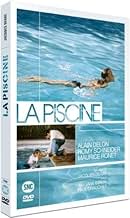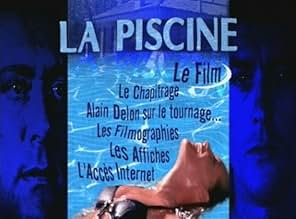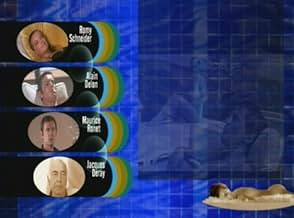La piscine
- 1969
- Tous publics
- 2h 2min
NOTE IMDb
7,1/10
16 k
MA NOTE
Jean-Paul et Marianne forment un couple idéal et coulent des jours heureux dans leur villa de Saint-Tropez, jusqu'au jour où arrive Harry, au bras de l'incendiaire Pénélope. Ancien amant de ... Tout lireJean-Paul et Marianne forment un couple idéal et coulent des jours heureux dans leur villa de Saint-Tropez, jusqu'au jour où arrive Harry, au bras de l'incendiaire Pénélope. Ancien amant de Marianne, l'homme trouble cette vie tranquille. La tension monte.Jean-Paul et Marianne forment un couple idéal et coulent des jours heureux dans leur villa de Saint-Tropez, jusqu'au jour où arrive Harry, au bras de l'incendiaire Pénélope. Ancien amant de Marianne, l'homme trouble cette vie tranquille. La tension monte.
- Réalisation
- Scénario
- Casting principal
Maddly Bamy
- La mulâtre qui danse
- (as Madlybamy)
Steve Eckardt
- Fred
- (as Steve Eckart)
Stéphanie Fugain
- Une amie à la party
- (non crédité)
Avis à la une
La piscine or The Swimming Pool is a French crime film, directed by Jacques Deray, who is known as a master of crime, and written by Jean-Claude Carriere; a long time companion of Luis Bunuel, for instance. La piscine isn't necessarily the most accessible French crime film but I would say it is one of the best, at least from the 1960's. It is an erotic, Antonionian film characterized by French existentialism. Although, it is not a perfect film, by any means, it is a surprisingly captivating and intriguing study on modern life as well as on alienation from the world and the society; loneliness, anxiety, love and freedom. The absurdity of being and the meaninglessness of life, how, in the end, nothing really matters.
The story happens somewhere in the French Riviera, where a couple is spending their holiday at a luxury château, borrowed from their friends. During the opening credits, we see reflections of nature on water: images of birds and trees. After the credits, the camera rises up and the water surface turns out to be a swimming pool, next to which there lies a man -- an insightful shot of the vacant and anguished life of the bourgeoisie. Everything was a lie; beauty and the happiness of life were only elusive reflections -- which happens to be the leading theme of Deray's film.
Soon we hear a woman shouting "Jean-Paul," and the man turns out to be Alain Delon. The woman (Romy Schneider) swims across the pool, comes to the man and they start kissing, fiercely. The physic happiness of this married couple is almost perfect. But details reveal pressures that begin to erupt, slowly, beneath the surface. In order to resist this anxiety, they make up the most shallow things for them to do and, therefore, invite a friend of theirs, Harry who surprisingly brings his 18-year-old daughter (Jane Birkin) with him. At a surprise party -- that resembles the party of The Night (1961) by Michelangelo Antonioni -- the pressures lead to tragic consequences.
La piscine strips seemingly beautiful and happy people down from their illusory facade. Jean-Paul turns out to be a failed writer whose fragile ego hides mysterious cruelty in it. On one level, he resembles Camus' Mersault as an apathetic and disregard man who has lost his lust for life. His wife, Marianne (Schneider) is, in turn, a prisoner of her emotions and is unable to free herself from the chains of her husband. Harry is good-looking and wealthy but, in reality, all of his relationships are elusive and mendacious. Nobody cares about him. His daughter, Penelope (Birkin) is a beautiful young woman who arises to her femininity but finds it hard to compete with Marianne.
Jacques Deray relays a competitive, jail-like vision of the lives of these characters. We see them behind bars, pillars and windows; trapped in an unending rat race. They are captivated like wild beasts, who are ready to kill each other at any second. Furthermore, all the characters are spying on each other: Jean-Paul keeps an eye on Marianne and Harry, for he thinks that they might have an affair. Harry, on the other hand, spies on Jean-Paul and Penelope because his juvenile father instincts can't bear a contestant. Marianne is also spying on them, because she thinks that she might lose the competition of Jean-Paul to a younger woman.
In the name of existentialist film, La piscine begins from nowhere and ends in somewhere which is quite the same. So why watch a film where nothing happens? Because, on the other hand, everything happens. Why read Kafka and watch Tarkovsky? For the very same reason. Although, La piscine is not a masterpiece, I would recommend it as an insightful film about loneliness and the illusion of idyllic life.
The story happens somewhere in the French Riviera, where a couple is spending their holiday at a luxury château, borrowed from their friends. During the opening credits, we see reflections of nature on water: images of birds and trees. After the credits, the camera rises up and the water surface turns out to be a swimming pool, next to which there lies a man -- an insightful shot of the vacant and anguished life of the bourgeoisie. Everything was a lie; beauty and the happiness of life were only elusive reflections -- which happens to be the leading theme of Deray's film.
Soon we hear a woman shouting "Jean-Paul," and the man turns out to be Alain Delon. The woman (Romy Schneider) swims across the pool, comes to the man and they start kissing, fiercely. The physic happiness of this married couple is almost perfect. But details reveal pressures that begin to erupt, slowly, beneath the surface. In order to resist this anxiety, they make up the most shallow things for them to do and, therefore, invite a friend of theirs, Harry who surprisingly brings his 18-year-old daughter (Jane Birkin) with him. At a surprise party -- that resembles the party of The Night (1961) by Michelangelo Antonioni -- the pressures lead to tragic consequences.
La piscine strips seemingly beautiful and happy people down from their illusory facade. Jean-Paul turns out to be a failed writer whose fragile ego hides mysterious cruelty in it. On one level, he resembles Camus' Mersault as an apathetic and disregard man who has lost his lust for life. His wife, Marianne (Schneider) is, in turn, a prisoner of her emotions and is unable to free herself from the chains of her husband. Harry is good-looking and wealthy but, in reality, all of his relationships are elusive and mendacious. Nobody cares about him. His daughter, Penelope (Birkin) is a beautiful young woman who arises to her femininity but finds it hard to compete with Marianne.
Jacques Deray relays a competitive, jail-like vision of the lives of these characters. We see them behind bars, pillars and windows; trapped in an unending rat race. They are captivated like wild beasts, who are ready to kill each other at any second. Furthermore, all the characters are spying on each other: Jean-Paul keeps an eye on Marianne and Harry, for he thinks that they might have an affair. Harry, on the other hand, spies on Jean-Paul and Penelope because his juvenile father instincts can't bear a contestant. Marianne is also spying on them, because she thinks that she might lose the competition of Jean-Paul to a younger woman.
In the name of existentialist film, La piscine begins from nowhere and ends in somewhere which is quite the same. So why watch a film where nothing happens? Because, on the other hand, everything happens. Why read Kafka and watch Tarkovsky? For the very same reason. Although, La piscine is not a masterpiece, I would recommend it as an insightful film about loneliness and the illusion of idyllic life.
Ignore the Naysayers, "La Pacine" is a masterful film. A true example of the kind of film they only really made in that area: vibrant and glossy, where a voyeuristic camera just hovers and lingers, putting the viewer right there. It reminded me a lot of Jean-Luc Godard's "Contempt." The way it is filmed makes the viewer want to be in that world, and stay there as long as possible. I know that South France in 1960's seems a hell of lot better than our world today. If "La Pacine" was 3 hours long, I would still sit through it, just to BE there.
I found the acting performances to be extraordinary. So much in this film is conveyed through body language and facial expressions, that one hardly even needs to know French (or read subtitles) to understand what it happening. Romy Schneider and Jane Birkin are both great to look at, and I thought Jane Birkin in particular really did well to say a lot with few words.
The only thing that slightly drags "La Pacine" down is that it's slightly overlong in the drawn out expository section after the climax, which causes the film to loose a bit of punch by the end. So come hang out by the pool for a while, I don't think you'll regret it.
I found the acting performances to be extraordinary. So much in this film is conveyed through body language and facial expressions, that one hardly even needs to know French (or read subtitles) to understand what it happening. Romy Schneider and Jane Birkin are both great to look at, and I thought Jane Birkin in particular really did well to say a lot with few words.
The only thing that slightly drags "La Pacine" down is that it's slightly overlong in the drawn out expository section after the climax, which causes the film to loose a bit of punch by the end. So come hang out by the pool for a while, I don't think you'll regret it.
And what eye candy - Alain Delon.
"La Piscine" is about two impossibly beautiful people in various stages of undress having a lot of foreplay. Or so it seems. Jean- Paul (Delon) and his lover (or wife, not sure) Marianne (Romy Schneider) are vacationing in a friend's mansion in Saint-Tropez. Lots of sun, making out, and swimming.
Marianne's ex-beau, Harry (Maurice Ronet) calls to say he's in the area, and Marianne invites him and his nubile daughter Penelope (Jane Birkin) to stay with him.
It's obvious that Harry still desires Marianne, so there is automatic tension. Then Jean-Paul seduces Penelope. Soon tension leads to something worse.
"La Piscine" is a typical foreign film - the ideas are sometimes obtuse, and it moves slowly. It's also too long by as much as a half hour. It's hard to concentrate on the plot because the beauty of the stars, Delon and Schneider, and their incredible chemistry overwhelm the story - to the extent that one doesn't really understand Jean- Paul's attraction to Penelope.
What erupts is the suppressed anger of the once-suicidal Jean-Paul, the competitiveness between him and Harry, and Harry's jealous possession of his daughter, whom he only recently met. As Penelope says, he likes to have her travel with him because people often think she's his mistress.
Schneider and Delon were a famous real-life couple but had broken up about five years earlier. Their chemistry is undeniable, and it's heartbreaking to think about what happened to her. Both actors give very "movie" performances - nothing overplayed, many subtle, nonverbal reactions. All of the acting is good, and the conflict scene between Harry and Jean-Paul is excellent.
"La Piscine" is considered a classic, but I believe many Americans had a hard time with it due to its languid pace and a tendency to look for action rather than psychology. Enjoy it for the beautiful photography and beautiful actors, if nothing else.
"La Piscine" is about two impossibly beautiful people in various stages of undress having a lot of foreplay. Or so it seems. Jean- Paul (Delon) and his lover (or wife, not sure) Marianne (Romy Schneider) are vacationing in a friend's mansion in Saint-Tropez. Lots of sun, making out, and swimming.
Marianne's ex-beau, Harry (Maurice Ronet) calls to say he's in the area, and Marianne invites him and his nubile daughter Penelope (Jane Birkin) to stay with him.
It's obvious that Harry still desires Marianne, so there is automatic tension. Then Jean-Paul seduces Penelope. Soon tension leads to something worse.
"La Piscine" is a typical foreign film - the ideas are sometimes obtuse, and it moves slowly. It's also too long by as much as a half hour. It's hard to concentrate on the plot because the beauty of the stars, Delon and Schneider, and their incredible chemistry overwhelm the story - to the extent that one doesn't really understand Jean- Paul's attraction to Penelope.
What erupts is the suppressed anger of the once-suicidal Jean-Paul, the competitiveness between him and Harry, and Harry's jealous possession of his daughter, whom he only recently met. As Penelope says, he likes to have her travel with him because people often think she's his mistress.
Schneider and Delon were a famous real-life couple but had broken up about five years earlier. Their chemistry is undeniable, and it's heartbreaking to think about what happened to her. Both actors give very "movie" performances - nothing overplayed, many subtle, nonverbal reactions. All of the acting is good, and the conflict scene between Harry and Jean-Paul is excellent.
"La Piscine" is considered a classic, but I believe many Americans had a hard time with it due to its languid pace and a tendency to look for action rather than psychology. Enjoy it for the beautiful photography and beautiful actors, if nothing else.
The failing writer Jean-Paul (Alain Delon) and his lover Marianne (Romy Schneider) are together for more than two years and spending vacation in a mansion in Saint-Tropez that belongs to a friend of them. They spend most of the time in the swimming pool that is the main attraction of the real estate. Jean-Paul is an insecure man and tried to commit suicide because of the reviews of his last novel but now is recovered.
When the successful composer Harry (Maurice Ronet), who had been Marianne's lover for four years, calls her and tells that he is passing by Saint-Tropez with his teenage daughter Pénélope (Jane Birkin), she invites them to come to the mansion to stay with Jean-Paul and her. Soon Harry woos Marianne trying to rekindle their former relationship and there is a tension in the house. Jean-Paul does not react and seduces Pénélope instead that discloses the true feelings of Harry towards him. One night, Harry comes late night drunken and argues with Jean-Paul, telling that he is a loser. However he falls in the swimming pool and Jean-Paul does not let him leave the water. Harry is drowned by Jean-Paul that forges a situation indicating that Harry has accidentally died. However the smart Inspector Lévêque (Paul Crauchet) does not buy the evidences of accident. What will happen to Jean-Paul?
"La Piscine" is a movie with a simple, sensual and tense story with a sexy beginning. Romy Schneider is among the most beautiful women in the world and her eyes, her face and her body mesmerize any male viewer. The characters are not well developed and keep a mystery of their true intentions, leaving to the viewer's interpretation. The cinematography is bright like the weather in Saint-Tropez, and the beauty and the eyes of Romy Schneider, Jane Birkin and Alain Delon are highlighted by the camera. The most impressive is that this movie has not aged after almost fifty years. My vote is seven.
Title (Brazil): "A Piscina" ("The Swimming Pool")
Note: On 28 January 2017, I saw this film again.
When the successful composer Harry (Maurice Ronet), who had been Marianne's lover for four years, calls her and tells that he is passing by Saint-Tropez with his teenage daughter Pénélope (Jane Birkin), she invites them to come to the mansion to stay with Jean-Paul and her. Soon Harry woos Marianne trying to rekindle their former relationship and there is a tension in the house. Jean-Paul does not react and seduces Pénélope instead that discloses the true feelings of Harry towards him. One night, Harry comes late night drunken and argues with Jean-Paul, telling that he is a loser. However he falls in the swimming pool and Jean-Paul does not let him leave the water. Harry is drowned by Jean-Paul that forges a situation indicating that Harry has accidentally died. However the smart Inspector Lévêque (Paul Crauchet) does not buy the evidences of accident. What will happen to Jean-Paul?
"La Piscine" is a movie with a simple, sensual and tense story with a sexy beginning. Romy Schneider is among the most beautiful women in the world and her eyes, her face and her body mesmerize any male viewer. The characters are not well developed and keep a mystery of their true intentions, leaving to the viewer's interpretation. The cinematography is bright like the weather in Saint-Tropez, and the beauty and the eyes of Romy Schneider, Jane Birkin and Alain Delon are highlighted by the camera. The most impressive is that this movie has not aged after almost fifty years. My vote is seven.
Title (Brazil): "A Piscina" ("The Swimming Pool")
Note: On 28 January 2017, I saw this film again.
A French drama; A story about crime in a sumptuous idyll. Still air. Mediterranean sun. One pool. Two lovers. Two guests. One is an old acquaintance to one and a former lover to another; the other is his daughter, a mystery to all. Hedonism, sensuality, eroticism, sexual longing, anxiety, and unfulfillment - it all leads to weakness for one and a dastardly deed. A film that is slow-moving and its drama as enervating as the heat over the villa could easily drain the energy of the viewer, but it is energising, and the camera loves these beautiful, chic people and the intrigue they create. The story is well written. The drama is well controlled.
Alain Delon's Top 10 Films, Ranked
Alain Delon's Top 10 Films, Ranked
To celebrate the life and career of Alain Delon, the actor often credited with starring in some of the greatest European films of the 1960s and '70s, we rounded up his top 10 movies, ranked by IMDb fan ratings.
Le saviez-vous
- AnecdotesThe film reunited a 1960's "mythical couple' Alain Delon and Romy Schneider. Schneider had dramatically broken-up with Delon couple years earlier and married German director and actor Harry Meyen in Berlin. She had a child, but Delon never truly let go. He began pursuing her again soon after their split, attempting to reconcile despite her new life. His determination was evident when he insisted on her being cast in the film, even threatening to quit if she wasn't included-despite producer Gérard Beytout's misgivings, as he was dubious about the actress from the Sissi (1955) trilogy in a bikini. During and after filming, Delon continued his relentless pursuit, and though Schneider repeatedly refused, their undeniable emotional connection translated into palpable on-screen chemistry. His efforts to win her back persisted long after the film, spanning much of her life and adding an emotional depth to their real and cinematic legacy.
- GaffesA body of someone that has just drowned does not float on water. Only after the decaying process has started and gases build up in the body does the body float to the surface.
- Crédits fousThe opening credits shimmer, as though they were being projected onto the surface of the swimming pool.
- Versions alternativesEnglish version. As all the cast, except Paul Crauchet, were fluent in English the scenes were shot both in French and in English. This version proves to be funny for the English-by-the-book used in the dialogue (obviously a line by line rendition of the original French script). The English version is also about ten minutes shorter with slightly different edit and has a few other differences (such as Romy Schneider wearing a bikini top in the English version in scenes where she is topless in the French version).
- ConnexionsFeatured in La vengeance du serpent à plumes (1984)
Meilleurs choix
Connectez-vous pour évaluer et suivre la liste de favoris afin de recevoir des recommandations personnalisées
- How long is The Swimming Pool?Alimenté par Alexa
Détails
- Date de sortie
- Pays d’origine
- Site officiel
- Langues
- Aussi connu sous le nom de
- La piscina
- Lieux de tournage
- Ramatuelle, Var, France(villa and swiming pool at L'Oumède)
- Sociétés de production
- Voir plus de crédits d'entreprise sur IMDbPro
Box-office
- Montant brut aux États-Unis et au Canada
- 211 467 $US
- Week-end de sortie aux États-Unis et au Canada
- 3 867 $US
- 16 mai 2021
- Montant brut mondial
- 341 243 $US
- Durée
- 2h 2min(122 min)
- Mixage
- Rapport de forme
- 1.66 : 1
Contribuer à cette page
Suggérer une modification ou ajouter du contenu manquant

![Regarder Bande-annonce [OV]](https://m.media-amazon.com/images/M/MV5BNzFiYWQzZjAtYjQ2Ni00ZWIzLTk4OTctNzg0NTNiMjc2ZjlkXkEyXkFqcGdeQXRyYW5zY29kZS13b3JrZmxvdw@@._V1_QL75_UX500_CR0)






























